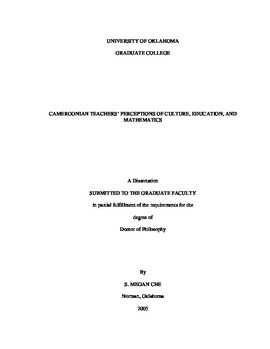| dc.contributor.advisor | Houser, Neil, | en_US |
| dc.contributor.advisor | Fleener, Jayne, | en_US |
| dc.contributor.author | Che, S. Megan. | en_US |
| dc.date.accessioned | 2013-08-16T12:19:48Z | |
| dc.date.available | 2013-08-16T12:19:48Z | |
| dc.date.issued | 2005 | en_US |
| dc.identifier.uri | https://hdl.handle.net/11244/869 | |
| dc.description.abstract | This study is a critical ethnography of Cameroonian secondary school teachers, with the purpose of generating understandings of Cameroonian teachers' perceptions of and meanings for culture, education, and mathematics and the relationships among these ideas. As Cameroon is a recently-independent, post-colonial nation, a further focus is an analysis of continuing Western influence on Cameroonian teachers' perspectives, actions, and cultures. This study seeks to make sense of and provide insight into a group of Cameroonian educators' processes of educating in a non-Western setting from an inherited, Western educational situation. Colonization in Cameroon is described, drawing on Cameroonian historical and educational sources. Coming from a primarily Freirean critical perspective, this study then relates hegemonic structures of language, mathematics, modernism, and Westernism to interview and survey responses. The concept of cultural invasion is one explanatory notion which illuminates understandings of Cameroonian teachers' perspectives. The primary data source consists of in-depth interviews with Cameroonian mathematics teachers; a secondary data source includes surveys conducted with non-mathematics teachers. Findings indicate that the teachers in this study rarely articulate broad power relations with the West which constrain the teachers' actions and possibilities. Further, participants generally value Western influence as a means for more rapid development. Teachers also value practical, applicable, and concrete mathematical skills to abstract ideas; many teachers also express a value for increased access to vocational/technical education. One implication of this study is that the hidden nature of broad power relations serving Western interests helps to perpetuate asymmetrical material conditions. | en_US |
| dc.format.extent | viii, 169 leaves ; | en_US |
| dc.subject | Educational anthropology Cameroon. | en_US |
| dc.subject | Anthropology, Cultural. | en_US |
| dc.subject | High school teachers Cameroon Attitudes. | en_US |
| dc.subject | Education, Secondary. | en_US |
| dc.subject | Education, Mathematics. | en_US |
| dc.subject | Public opinion Cameroon. | en_US |
| dc.title | Cameroonian teachers' perceptions of culture, education, and mathematics. | en_US |
| dc.type | Thesis | en_US |
| dc.thesis.degree | Ph.D. | en_US |
| dc.thesis.degreeDiscipline | Department of Instructional Leadership and Academic Curriculum | en_US |
| dc.note | Advisers: Jayne Fleener; Neil Houser. | en_US |
| dc.note | Source: Dissertation Abstracts International, Volume: 66-02, Section: A, page: 0527. | en_US |
| ou.identifier | (UMI)AAI3164559 | en_US |
| ou.group | Jeannine Rainbolt College of Education::Department of Instructional Leadership and Academic Curriculum | |
